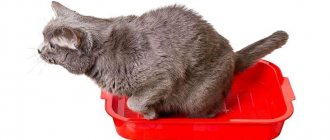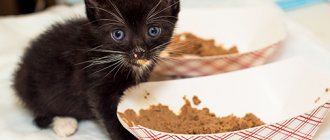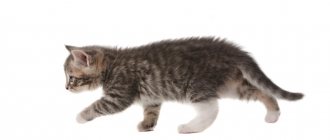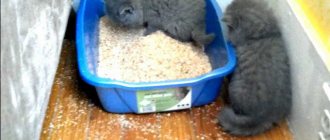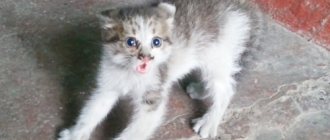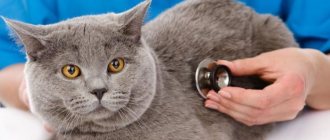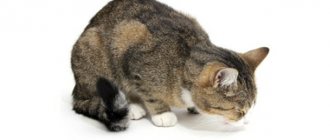The kitten does not go to the toilet in a big way
For the first 20 days of life, the furry baby is looked after by a cat. She licks it and also stimulates the anus area with her tongue, which causes natural evacuation. Sometimes a cat does the same with a month-old kitten, which helps him go to the toilet in a big way.
Important! Constipation is often caused by separation from the mother too early.
After three weeks, the kitten does not walk much like an adult; another 10–12 days should pass. The grown-up cub begins to eat dense food, the digestive system is already ready to accept such a composition, but mother's milk still predominates in its diet.
From 1 month, the kitten begins to have its first formed stool. During this period, the baby walks extensively every day, at least 4 times. Gradually, he defecates less and less, but the owner of the animal should know that if the kitten does not poop at least once a day, it is necessary to determine why this is happening.
Most likely, feces have accumulated in the baby’s intestines and formed a plug that prevents natural bowel movements. This condition threatens the health of the animal, and intoxication of the body begins.
Recommendations
How to get a kitten to go to the toilet? After feeding, carefully and at the same time firmly fix the pet so that it cannot slip out. The fingers of the hand should be located simultaneously under the chest and stomach, so that the tail is towards the caregiver. You need to put a damp, warm napkin on your other hand, preferably white, but you can also use light colors, because it’s easier to tell on a light fabric whether the kitten went to the toilet or not.
Next, you need to stimulate the baby to urinate. Do not apply strong pressure and wipe the area from the lower abdomen to the anus. If the kitten went to the toilet (did not defecate - wiping continues), then you need to move to the anal area, doing a specific massage. Usually the effect occurs within a minute. But it happens that animals cannot go even after several feedings. Then you need to show him to a veterinarian.
After the job is done, you must first wipe the contaminated areas of the skin with a clean edge of the napkin (urine and feces are irritating, and dermatitis or a genitourinary tract infection may develop at the site of their appearance, since there is no strong immunity yet formed). It is also necessary to dry wet areas. This procedure is done for each kitten.
If there are several children, separate napkins are allocated for each of them (these can be pieces of bandage, gauze, cotton pads, which are thrown away after use). The whole procedure must take place in a warm room without drafts, otherwise the baby will become hypothermic and die.
How to tell if your baby is constipated
For many cat owners, determining the occurrence of constipation is extremely difficult. However, by carefully observing the animal, you can “catch” the problem at the very beginning. The absence of stool in the tray is an important, but not the main indicator that the kitten does not go to the toilet.
Problems are manifested by the following symptoms:
- frequent visits to the toilet that do not bring results;
- loud meowing on the tray;
- decreased appetite;
- very dry and hard feces;
- mucous discharge from the anus;
- weight loss;
- sudden screams, lethargy.
If no measures are taken, the small pet will begin to be afraid to walk, its health will worsen, and there will be a real threat of death. The solution to a problem such as constipation should not be delayed. You need to show the kitten to a doctor as soon as possible.
How to determine that a kitten wants to go to the toilet?
Many inexperienced owners are afraid that they will not be able to determine when the kitten wants to poop. If a cat scratches the surface with its paws, the owner should transfer it to the tray as soon as possible. Usually the kitten understands from the first time what is required of him.
Another way to determine that a cat wants to go to the litter box is this behavior when he seems to sniff around, as if looking for a place. It is also worth looking at the pet’s eyes; if the owner sees that the cat seems to be glazed over, then he is definitely thinking about his goal. As soon as the cat begins to show such signs, it means that she wants to poop.
Most common reasons
If the kitten does not go to the toilet regularly, you can and should try to determine the cause of constipation. This is the best way to solve the problem.
If a kitten does not walk at 1 month, most likely, its mother is to blame for depriving her child of attention and care. Perhaps the cat is inexperienced or lazy, but it is she who must daily stimulate the activity of the cub’s internal organs by licking.
Factors that cause defecation delay:
- Stress. This could be moving to a new place, changing owners, separation from the mother, too much communication with children, fear of sharp sounds or other animals. Nervous tension almost always leads to constipation. The problem of rare stool in a kitten will disappear by itself when the pet calms down and the unpleasant situation changes.
- Wrong diet for a kitten. This provokes disturbances in the gastrointestinal tract. Sometimes owners, due to inexperience, offer their pet several new products at once. This cannot be done. You should introduce one innovation at a time into your baby’s diet and pause for 4–5 days. This will allow the kitten's intestines to adapt.
- Little drinking water. The kitten should always be able to drink whenever he wants.
- Congenital defects in the development of the animal's excretory system.
- Entry of a foreign body into the baby's digestive tract. This makes it difficult for the feces to pass out, and the kitten cannot poop for a long time.
- Disease of internal organs or parasitic infestation.
Important! It is necessary to ensure that the animal does not swallow a small toy or piece of litter for the tray, in order to avoid intestinal blockage.
Factors causing the problem
Disorders of the gastrointestinal tract in cats can be identified by the following signs:
- stool is too dry or too runny;
- the color of the stool is different from the standard dark brown;
- foreign objects in stool.
A cat poops blood when it goes to the toilet for the most part
Constipation is divided into several categories:
- inherently: organic and functional;
- by patency: full or partial;
- by signs: pain or tension.
The cause of problems with bowel movements can be anything. The main thing to remember is that constipation is not a symptom, but an independent disease.
Factors that can trigger delayed bowel movements include:
- unbalanced nutrition - lack of necessary vitamins and microelements in the feed, excess carbohydrates;
- excess and accumulation of hair in the gastrointestinal tract: sometimes hair does not leave the cat’s body and accumulates in the intestines;
- foreign objects in the gastrointestinal tract: small bones and other objects most often get stuck in the intestines, which prevents the passage of feces;
- various pathologies: inflammatory processes, serious diseases of the gastrointestinal tract, cardiovascular and genitourinary systems;
- tumors in the genitourinary system;
- diabetes mellitus, obesity, urolithiasis;
- the presence of worms;
- infections;
- stress.
After childbirth
Some cats have a decreased appetite before giving birth and go to the toilet frequently. This is due to the pet’s subconscious attempt to “cleanse” the body before giving birth. After giving birth, cats may not defecate for up to three days. This happens because the cat loses a large amount of fluid while feeding kittens.
Important! In case of postpartum constipation, the cat should be helped to defecate by adding Vaseline or vegetable oil to the food. If this does not help and the cat does not go to the toilet for a day, then you need to contact a veterinarian.
After castration
The postoperative period is quite difficult for pets. After castration (sterilization), the animal is prohibited from adding any oil to the food. Such supplements are absorbed into the body very quickly, and castor oil can generally cause severe stomach upset.
Cat after surgery
Important! In addition to regular treatment of sutures and their proper removal, it is necessary to monitor your pet’s stool. Your cat may experience constipation or diarrhea.
After surgery, bowel movements should pass within three days. A pet can defecate largely unnoticed, little by little. The animal needs a soft diet after castration (sterilization), which will not strain the abdominal wall. Otherwise, there is a risk of seams coming apart.
The main reason for problems with bowel movements after surgery is the anesthesia. The animal takes it hard and takes a long time to come to its senses. In addition, the process of bowel movement in the first days after surgery is painful.
First aid at home
For adult cats, the normal defecation rhythm is considered to be visiting the litter box once a day. Kittens go to the toilet much more often, but no more than 5 times a day. It all depends on the age and influence of factors that determine the condition of the animal.
If the kitten does not go to the toilet for the second day, he was not stressed, and his food was not changed, you can try to help the pet at home.
The most effective ways to combat constipation are:
- abdominal massage;
- adding oil to food;
- injection of soap into the anarectal area of the rectum;
- using an enema;
- medications.
Attention! Only a doctor can determine the dose of medicine for an animal.
Massage
The procedure lasts from 3 to 5 minutes. The kitten is placed on its back and held with the left hand. Using a damp cloth or sponge, stroke along the tummy, towards the tail.
Movements should be gentle, without pressure. The comfort of the little patient is the main condition for the success of the procedure.
Oil
If the kitten rarely walks, you can add 4-5 drops of vegetable oil to its food. A product made from olives, flax or petroleum jelly will help. It is better not to take sunflower oil, it depresses the liver.
Some pet owners drop the oil directly into their pet's mouth using a syringe without a needle. If a 5-month-old kitten does not walk for more than 1 day, 1/2 tsp will be enough. oils per day.
Soap
The procedure is quite unpleasant for the animal. It is better to do it during sleep.
A bar of soap is shaped into an oval shape, dipped in water and placed in the anorectum. After 1–2 hours, the kitten, which has not pooped for a long time, goes to the toilet.
Enema
If the kitten has not been able to poop for several days, you can use a syringe without a needle as an enema. Its tip should be lubricated with Vaseline, and the reservoir should be filled with warm water.
It is better to carry out the procedure with an assistant. The tip of the syringe is inserted into the animal's rectum. If the owner does not have experience, you can ask the veterinarian to do everything necessary.
Medicines
You cannot choose medications for constipation on your own; they are prescribed by a doctor. As a rule, these are special formulations for kittens. Lactusan is most often prescribed; it has a fairly mild laxative effect.
Help for newborns
Regardless of the reason why a newly born kitten cannot recover, you need to help the baby go to bed. To do this you will need: damp cotton wool, several clean and soft napkins. The surface on which the procedure will be performed (for example, a table) must be covered in advance with an absorbent diaper.
You need to take the newborn with your left hand and start massaging the anus with damp cotton wool. The hand moves clockwise. This stimulates natural bowel movements.
After the little kitten gets wet, he is dried and placed on a diaper, under which a warm heating pad is placed. The massage lasts 1–2 minutes and should be done daily.
If, despite massage, the animal does not go to the toilet well, an urgent examination of the pet by a veterinarian is necessary.
Treatment of constipation
Many owners who are faced with this problem begin to look for information: the kitten is constipated - what to do? The best decision would be to show the kitten to a veterinarian. After examining the animal, he will find out the cause, prescribe appropriate treatment and tell you what medications can be given and how many times a day.
Taking medications without consulting a doctor can only make the situation worse. Typically, laxatives and medications to normalize intestinal microflora are used to treat constipation.
Among laxatives, Lactusan and Duphalac are lactulose-based drugs that have proven themselves well. In some cases, Espumisan, Festal are prescribed, the dose is determined by the veterinarian.
Bifidumbacterins are indicated to improve microflora.
Proven folk methods, for example, Vaseline oil, will also help to effectively pass feces. The dosage is determined based on the kitten's weight. For example, if the baby weighs 1 kilogram, then no more than 1 ml of oil will be needed.
How to give Vaseline oil to a kitten? First of all, you need to fix it and quickly introduce oil into your mouth using a syringe without a needle. The effect will occur in 12-16 hours.
What to do if your kitten is constipated? Massage also helps very well in these cases. A cat mother performs this procedure on her babies not only to teach them personal hygiene, but also to stimulate the functioning of the intestines and all internal organs.
If the kitten you take into your home is too small, you will need to massage it every day for 3-5 minutes, this is an essential part of care. Light stroking circular movements on the tummy will help your cat get rid of gastrointestinal problems.
Although an enema is a very effective remedy for constipation, this remedy is not recommended for use. It can be done at home only in extreme cases and with the necessary experience.
If the kitten has a tumor, and it is this that is causing constipation, then the tip of the syringe (a 10 ml syringe without a needle is used) can easily injure the tumor. It is advisable to avoid enemas, as there is a risk of damaging the thin walls of the intestines.
The baby will obviously not like this procedure, so he needs to be securely fixed in a standing position. It would be a good idea to ask someone in the household to help. It is best to carry out the procedure immediately after sleep, while the animal is in a relaxed state. Next, it should be placed in a basin or bathtub so that in case of rapid waste of feces, the surfaces can be quickly cleaned.
The tip of the syringe is lubricated with Vaseline and carefully inserted into the kitten's anus. The water should be at room temperature, clean, and administered in small portions. If the manipulation is performed with sudden movements, the rectum can be torn.
Often, inexperienced pet owners think that the most proven method for constipation is soap, when a small piece of soap is inserted into the anus. This cannot be done! Soap, irritating the intestinal mucosa, will lead to bowel movement, but this can lead to allergies. Don't risk your baby's health!
Professional veterinary care
The veterinarian's job is to diagnose and then prescribe treatment based on the results obtained.
Diagnostics
To determine the nature of the pathology, the doctor uses external examination, palpation, rectal examination, and laboratory data. As a rule, for diagnosis you need to do an ultrasound of the abdominal area, an x-ray using a contrast agent (2 projections).
This allows you to determine the amount of stagnant feces, the presence of foreign objects or neoplasms, and the size of the intestinal lumen. If necessary, blood electrolytes are examined.
Treatment
Depending on the severity of the animal’s condition, the doctor conducts infusion therapy after the procedure for cleansing the furry patient’s intestines. As a rule, an enema is used, but it is done under anesthesia, since the process can be painful.
The doctor adjusts the animal’s diet and draws up a drug treatment regimen. Usually laxatives and droppers are prescribed.
One of the best drugs of this spectrum of action for kittens is Duphalac. The medicine is given to the pet twice a day, the dosage is calculated by the doctor. The composition is not recommended for use simultaneously with Vaseline oil.
Often, to treat constipation in a kitten, a mild lactulose laxative is used - Lactusan. The dosage of the product is determined by the veterinarian, based on the individual characteristics of the animal, the nature of the pathology, and the weight of the pet.
The most common causes of constipation in a kitten
Common causes of constipation in kittens include the following:
- the baby is used to eating his mother’s milk, so when switching to regular food, the intestines do not always cope with digestion;
- stress or fear. Constipation in a kitten can be a consequence of early separation from its mother, aggression from other animals, or as a result of communication with people;
- The physiological characteristics of the digestive tract in kittens change depending on age. The smaller the pet, the more likely it is to develop intestinal problems, especially if the baby is bottle-fed. Therefore, in such cases, digestive problems very often develop against the background of dysbiosis;
- the presence of hairballs or foreign objects in the intestines. At a young age, pets play a lot, so they often swallow some object;
- poor nutrition. This section needs to be given special attention, since the baby’s body is weak and requires balanced food;
- parasite infection. Even if the kitten is completely domestic, the possibility of infection with worms cannot be ruled out. First of all, everything depends on the health of the mother cat, as well as her care;
- Small kittens are more susceptible to various diseases than adults. Therefore, constipation can be caused by infections. Unfortunately, it is difficult for a person to immediately understand what is happening to an animal and provide timely help. Moreover, diseases can take different forms;
- If the baby is still sick, then taking medications often affects digestion and stool. Medications must be taken according to instructions. In addition, it is worth closely monitoring the condition of the newborn in order to promptly determine the negative effects of medications;
- Intestinal obstruction is often associated with a sedentary lifestyle. Therefore, you should not limit the cat’s movements and games;
- Poisoning is also a cause of the problem. As a result of the action of bacteria, the body experiences stress, resulting in impaired intestinal function.
Preventing constipation
People often ask what to do if a kitten does not go to the toilet for several days (for example, 5). Most likely, the baby has chronic constipation. In such a situation, neither a massage nor an enema will help.
First of all, it is necessary to review the diet of your furry pet. It has been noticed that if you feed a kitten with special holistic formulas and super-premium ingredients, constipation rarely occurs or does not occur at all.
Interesting! The transition of an animal to a new method of feeding must be done gradually, avoiding increasing single portions. This is not recommended for very young kittens.
With a natural feeding method, the baby’s diet must include cereals and vegetables. They improve intestinal function. A little fresh minced meat is added to the menu for teenage kittens.
If your baby is reaching for fresh cucumber or cabbage, let him enjoy the healthy fiber. It is allowed to give melon, green peas, beets, zucchini, carrot pieces, and weak meat broth.
Interesting! If the kitten eats natural food, it must be enriched with steamed bran, this will help the baby’s digestion cope with the load.
Sometimes constipation is caused by hairballs that the animal swallows while licking. There is special food for breeding them. In addition, the pet must be brushed regularly.
Most experts point to the importance of movement to prevent constipation in fur babies. The more the kitten plays, the better the intestines work.
Prevention measures
Such an unpleasant phenomenon as constipation can be completely avoided. To do this, you need to adhere to the simplest rules of prevention:
- Give your kitten antiparasitic medications regularly to prevent the accumulation of helminths in the intestines.
- Teach your baby to an active lifestyle. An active, playful kitten suffers from constipation much less often than a phlegmatic little ball that constantly sleeps.
- If constipation is accompanied by vomiting, consult a doctor immediately!
- Brush the fur regularly to prevent it from collecting in the intestines.
- Adjust the menu. It must contain the required amount of fat, liquid, and fiber.
And lastly: do not neglect regular examinations by the veterinarian, because constipation may be caused by some quietly developing pathology in the baby’s body.
The kitten does not go to the toilet in a big way in the new house
Moving can be very stressful for a pet. A tense state, as a rule, negatively affects the functioning of the digestive system. Therefore, you should not be surprised if the kitten does not go to the toilet in a new place all day.
A reaction to a new situation may also include:
- refusal to eat;
- lack of urine (the kitten stops peeing);
- desire to hide.
The animal owner will need patience and affection to help the pet adapt and get rid of fear. It happens that a kitten does not go to the toilet in a big way in a new place for 3 or 4 days, and then the intestines begin to function normally again.
Important! It is a very bad idea to combine moving to a new home with switching to unusual foods. A frightened pet may not go to the toilet for a long time.
What to do for prevention?
If the baby has not yet gotten used to the new owners, then their task is to accustom him to the new toilet.
As soon as the kitten appears in the house, you must immediately introduce him to his personal toilet and show him where the litter box is located. Sometimes in a new place an animal does not know where to relieve itself, and its upbringing does not allow it to go anywhere. In this case, the baby suffers, which is why constipation appears. Another important point is the selection of proper, balanced nutrition. It is better to create a diet or select a suitable brand of ready-made food together with a veterinarian.
It is forbidden to suddenly switch to a new type of food, and if the cat eats natural food, it is important to ensure that prohibited foods do not fall into his bowl - fried, spicy, salty, fatty, sweets. In addition, you should periodically give your pet anthelmintic drugs, and promptly treat the animal for fleas, lice and ticks. If there are characteristic symptoms of digestive disorders, do not self-medicate, but take your four-legged friend to an appointment with a veterinarian.
Kitten doesn't poop in the litter box
If you notice that the kitten does not go to the toilet for 2-3 days, but does not show signs of illness, you can look for the pet’s “secret room”. It can be anywhere: behind a closet, in a flowerpot, on the balcony. The sooner you find an impromptu toilet, the sooner you can teach your baby to use the litter box.
Sometimes it happens that a small pet refuses to go to the toilet in a big way, although it regularly pees there. He leaves feces nearby or in a completely different place. If a kitten has not used the litter box for 3 whole days, experienced cat breeders advise placing another one next to the toilet.
Some pets cannot do all their “things” in one tray due to their increased cleanliness. The appearance of another toilet will solve the problem.
The appearance of constipation in kittens is not as harmless as it might seem at first glance. But in most cases, the problem can be dealt with if the animal owner notices warning signs in time and takes action.
When a kitten begins to walk less and less often, there is a reason to take a closer look at the pet, adjust its diet, and check for a sufficient amount of water. If the baby's condition worsens, he needs to be examined urgently at a veterinary clinic.
Causes
Most often, constipation in kittens occurs in the first weeks of life. They can affect both newborn babies and kittens one to one and a half months old. The owner needs to ensure that all his charges recover on time, at least once a day, and, if this does not happen, help them. If the kitten does not pass urine the next day, urgent measures must be taken, since constipation is very dangerous for the health and life of such a baby.
Kittens over two months of age may suffer from constipation for a very common reason: in the house of the previous owner, they were fed with mother's milk and ate the same food as the mother cat. New owners offer them completely different food, unusual for their stomach or generally unsuitable for their age, which negatively affects the functioning of the intestines.
As a rule, a two-month-old kitten tolerates separation from its mother almost painlessly. Once in a calm, friendly environment, he adapts quite quickly. New owners just have to choose the right brand of food, provide the baby with constant access to water, and no problems with bowel movements should arise.
The best option would be to find out from the previous owners the brand of food that your new pet is used to, and at least give it to the kitten for the first time. In the future, you can switch him to the food that suits you. This should be done gradually, replacing part of the kitten’s usual food with a new product. But at least for a few days after the move, try to give your pet its usual food. There must be a bowl of clean, fresh water next to the kitten’s bowl so that he can drink without restriction. If, after all the measures you have taken, after 2 days the intestinal function still has not improved, be sure to show the kitten to the veterinarian. Self-treatment can only worsen the situation and lead to serious complications and even the death of the animal.

